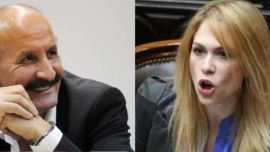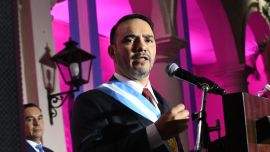Opposition hardliners, human rights groups and a US lawmaker have strongly criticised President Alberto Fernández after he declared that he wants Argentina to re-establish diplomatic relations with Venezuela.
Fernández, speaking on Monday during a press conference with Ecuador President Guillermo Lasso, called on countries across Latin America to improve ties with the Nicolás Maduro government in Caracas.
"As a first step, Argentina wants to recover its full diplomatic ties. It is a step that we are taking, and I really call on all Latin American countries to review it, because Venezuela has gone through a difficult time," Fernández told reporters.
The Peronist leader argued that previous diplomatic efforts, including the isolation of Maduro’s government, had failed to improve the lot of Venezuelans. The Argentine leader also suggested that human rights problems in the crisis-stricken country "have been dissipating."
Relations between Argentina and Venezuela are currently at the level of chargé d'affaires, though Fernández indicated on Monday that he was ready to agree to an exchange of ambassadors once again.
Under former president Mauricio Macri, Argentina joined the Lima Group of nations in 2017 and recognised, along with 50 other governments, opposition leader Juan Guaidó as Venezuela’s interim president following disputed election results.
During the Fernández government, Argentina has supported critical reports by UN High Commissioner for Human Rights Michelle Bachelet detailing alleged human rights abuses in Venezuela though it withdrew from the Lima Group, an entity that has almost ceased operations.
Pushback
Guaidó responded harshly to the proposal, addressing his criticism to Argentina’s leader directly on Twitter.
"President Fernández: if you want to help Venezuela demand, along with us, us free and fair elections, with the conditions set out in the recent European Union report, and demand justice for victims of human rights violations as stated by the UN and the International Criminal Court (ICC)," he said
“Denying the dictatorship does not help Venezuelans,” he added, arguing that such attitudes “re-victimise millions of migrants and refugees, thousands of victims of crimes against humanity and an entire society that resists.”
Fellow opposition leaders Julio Borges (Primera Justicia) and Leopoldo López (Voluntad Popular) also slammed the proposal, with the latter cautioning that resetting ties would "normalise a corrupt, murderous, drug-trafficking dictatorship."
Borges said the human rights situation in Venezuela is “far from improving, a proof of which is that an investigation was opened by the ICC to clarify the truth about the crimes of the dictatorship.”
Guaidó’s envoy in Buenos Aires, Elisa Trotta Gamus, said the comments were "very worrying" and "statements that are very far from reality."
Many members of the opposition Juntos por el Cambio coalition echoed the criticism, with PRO party leader Patricia Bullrich describing the news as “irresponsible and shameful.”
Pushback also came from United States Senator Marco Rubio, the Republican leader and member of the US Foreign Relations Committee. In a post on Twitter, he described the proposal as “foolish.”
“In Alberto Fernández's Argentina, the Kremlin’s influence is welcomed in our region, as well as the recognition of the tyrannical and illegitimate Maduro narco-regime in Venezuela,” wrote the former US presidential candidate.
Human rights
Criticism also rained down from Human Rights Watch, which observed that Maduro’s regime is still holding as many as 240 political prisoners behind bars.
The NGO’s Acting Americas Director Tamara Taraciuk described Fernández’s comments as “very worrying,” while highlighting a number of findings by investigative teams about freedom of speech, arbitrary arrests and possible crimes against humanity.
She called on the president to become better informed, lest he make the mistake of “giving legitimacy” to a “repressive regime.”
Those critiques were in turn backed by Amnesty International Argentina, which said in a statement that it had been "documenting and denouncing massive human rights violations" in Venezuela "for years."
Fernández had claimed on Monday that human rights problems in Venezuela were “dissipating” and that the country “has been making progress on its electoral process” with the help of officials from the European Union and Latin America.
"We believe that it is time to help Venezuela to fully recover its normal functioning as a country and as a society through dialogue. We are not going to achieve this if we leave it alone without ambassadors and without our attention," he added.
President Fernández plans to appoint Parlasur Vice-President Oscar Laborde as Argentina's ambassador in Caracas, a post that has been vacant for seven years, according to reports.
The future envoy is seen by analysts as someone who enjoys the trust of both the president and Vice-President Cristina Fernández de Kirchner, who was historically close to the late Venezuelan president Hugo Chávez, Maduro’s predecessor in office.
Maduro’s government formally requested this week that Stella Marina Lugo Betancourt be approved as Venezuela’s new envoy in Buenos Aires.
– TIMES/NA/PERFIL

























Comments